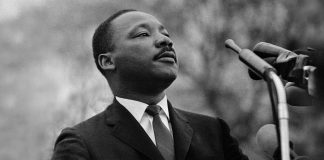Pets: Our help for a better life
I've always liked pets, but from a distance. Raised by a mother convinced that animals cannot possibly live under the same roof as people, I adopted a similar opinion, which I kept for many years, even if a great number of people tried to prove me wrong.
A rapid test concerning COVID-19 and religious freedom
At the heart of Religious Liberty is the issue of worship. Religious Liberty is the freedom to worship according to one’s own conscience.
Martin Luther King, Jr. | What have we to do with heroes?
On August 28, 2011, when the Martin Luther King, Jr. Memorial was opened to the public in Washington D.C., 48 years had passed since the famous “I have a dream” speech by the young African-American Baptist pastor.
The journey to financial freedom
Money . . . It’s the grease that makes the world go round, yet it’s one of the least chosen table topics of choice. With the rising cost of living, the price of lettuce being tripled and a seemingly never-ending list of things to pay for, many are worrying about their financial future. So long as we continue to ignore the conversation, the...
On the side of God and logic
Benjamin Solomon Carson is the famous American neurosurgeon who was the first to successfully separate conjoined twins in 1987.
The last man in the water
Self-sacrifice—the ability of some people to put the lives of others above their own—is not at all easy to understand.
Forgiving a Nazi
May 1944. The train stopped at the station and twins Eva and Miriam, with their father and mother and sisters Edit and Aliz, stepped out into the sunlight. There was war in Europe and the Nazis had gathered them and thousands of other Jews in Romania, crammed them into cattle cars and taken them to Poland.
What could light up our hope in times of war?
We know how to do normal things in peacetime, but how do we keep our life going and maintain our hope in times of war?
What is the link between religion and conspiracy?
In the famous realist novel A Journal of the Plague Year, Daniel Defoe blends the factual with the imaginary, describing the social context just before the great plague struck London in 1665. Among the reactions described, two straddle the line between religion and conspiracy.
Reformation: The real face of Christianity
The Great Reformation was not a simple schism within Western Christianity. It was not just a religious and political movement. The Protestant Reformation, with its particular spirit and principles, was, first and foremost, a return to the true source and values of Christianity—an attempt to restore.
The game where nobody wins
I was only 13 when I first experienced it. My three best girlfriends handed me a letter. It said they no longer wanted to be my friends. The only reason given was, “The guys pay you too much attention.” After delivering the letter, they simply shunned me.
What could console our terrible fear of death?
Along with the rising death toll due to coronavirus complications, a usually latent aspect of our fear becomes harder to ignore. Despite the fact that it is the only certainty we all share, realising that our own end is a reality we might need to confront sooner than we had thought leaves many of us fervently searching for consolation.
Eight months into the pandemic, where are we headed?
We do not know what 2020 would have looked like without a pandemic, but we already know that some losses could have been prevented. And, if the future lies in the spectrum of pandemics, as the WHO warns, we should learn all the lessons that can be learned from this long journey.
How do I learn to really enjoy life?
I don’t remember much about the moment. I remember its warmth, and the way it glowed with purpose and spirit. But the stage is blurry. The song which pulsed out from it is uncertain. I know it came from a good friend of mine, one whose spot-lit glory provoked in me no jealousy, no feeling of being left out.
“Relax…it’s just God”
When I read how a non-religious mother felt she needed to calm herself down at the thought that her child might begin to believe in God, I was surprised and almost offended.


























